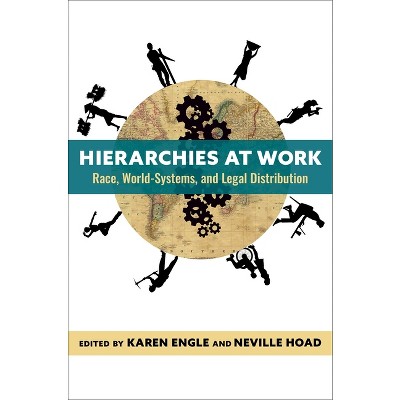Sponsored

Building the Worlds That Kill Us - by David Rosner & Gerald Markowitz
$120.00
In Stock
Eligible for registries and wish lists
Sponsored
About this item
Highlights
- Winner, 2025 Columbia University Press Distinguished Book Award Across American history, the question of whose lives are long and healthy and whose lives are short and sick has always been shaped by the social and economic order.
- About the Author: David Rosner is the Ronald H. Lauterstein Professor of Sociomedical Sciences and professor of history in the Graduate School of Arts and Sciences at Columbia University and the director of the Center for the History and Ethics of Public Health at the Mailman School.
- 408 Pages
- History, United States
Description
About the Book
Through the lens of death and disease, Building the Worlds That Kill Us provides a new way of understanding the history of the United States from the colonial era to the present.Book Synopsis
Winner, 2025 Columbia University Press Distinguished Book Award
Across American history, the question of whose lives are long and healthy and whose lives are short and sick has always been shaped by the social and economic order. From the dispossession of Indigenous people and the horrors of slavery to infectious diseases spreading in overcrowded tenements and the vast environmental contamination caused by industrialization, and through climate change and pandemics in the twenty-first century, those in power have left others behind. Through the lens of death and disease, Building the Worlds That Kill Us provides a new way of understanding the history of the United States from the colonial era to the present. David Rosner and Gerald Markowitz demonstrate that the changing rates and kinds of illnesses reflect social, political, and economic structures and inequalities of race, class, and gender. These deep inequities determine the disparate health experiences of rich and poor, Black and white, men and women, immigrant and native-born, boss and worker, Indigenous and settler. This book underscores that powerful people and institutions have always seen some lives as more valuable than others, and it emphasizes how those who have been most affected by the disparities in rates of disease and death have challenged and changed these systems. Ultimately, this history shows that unequal outcomes are a choice--and we can instead collectively make decisions that foster life and health.Review Quotes
This book is crucial reading for anyone who wishes to understand the curious failure of the USA to deliver health in return for the trillions of dollars it spends.--Mary T Bassett, Harvard University "The Lancet"
Named one of the best books of 2024.-- "Smithsonian Magazine"
The authors are great storytellers, and they begin with the early days of the nation and take us through the elements and decisions wedded to medicine's efficacy: the physicians and thinkers, industry and commerce, and, most strikingly, the maze of profit and politics that has led to the health care inequities and inefficiencies of today.--Katherine Ott, curator in the Division of Medicine and Science at the National Museum of American History "Smithsonian Magazine"
An important, expert chronicle of disease and health disparities in America that urges us to repair already existing sickness-beset communities and create a better society that ensures a safe place for all people to thrive.-- "Booklist"
This hard-hitting exposé will change how readers think about the nature of disease.-- "Publishers Weekly"
This important book spotlights the inequity of big industries imposing their harms on the general public (often protected by allies bought with political spending) and the further inequity of where those harms tend to fall.--U. S. Senator Sheldon Whitehouse
Building the Worlds That Kill Us does not simply demonstrate the many ways in which we (and our industries, legislatures, and courts) are responsible for the diseases that kill us. It also reveals the history of people fighting back to protect their health. This book is the culmination of decades of research by Rosner and Markowitz: it assembles their key arguments into an invaluable and comprehensive overview.--David S. Jones, author of Broken Hearts: The Tangled History of Cardiac Care
Building the Worlds That Kill Us is a great read and a historical tour de force. It is a fascinating, thorough, and terrifically important exploration of the social factors that have driven the health and disease of Americans from the nation's earliest days to the present.--David Michaels, George Washington University School of Public Health
Building the Worlds That Kill Us offers an incisive, sobering, and critically important new history of health in the United States, revealing how capitalism, commercial greed, and social injustice have worked to produce unequal suffering and disease across generations and the concerted work of reformers across time to right those wrongs. A brilliant, capacious, and instructive study by leading scholars of health and society.--Keith Wailoo, author of Pushing Cool: Big Tobacco, Racial Marketing, and the Untold Story of the Menthol Cigarette
After collaborating for more than fifty years, Rosner and Markowitz have written a sweeping book that traces devastating patterns in American public health history. Again and again, they show that economic and social forces determine the distribution of disease and suffering. Even as the particular health threats change over time--from smallpox, tuberculosis, cholera, and typhoid through lead, tobacco, PCBs, endocrine-disrupting chemicals, and even climate change--they take their toll on the poorest and most vulnerable. The esteemed elders of public health history leave little question that sickness and death often result from the decisions we make as a society. It's a dark truth, though one they leaven with the reminder that we always have the power to make better choices.--Sharon Lerner, reporter at ProPublica
An eagerly anticipated global history of environment and health, penned by two esteemed historians of public health.--Alfredo Morabia, editor in chief of the American Journal of Public Health
Every few decades a major study emerges that shines a vital new light on the appalling health inequalities in our society. Building the Worlds That Kill Us is one such study. Like earlier works by George Rosen, Rosemary Stevens, and Byrd and Clayton, this book by eminent historians David Rosner and Gerald Markowitz probes deeply into the socioeconomic roots of persistent health disparities and medical neglect. Covering the collective struggles against health injustices from America's birth to the present, Building the Worlds That Kill Us provides an invaluable roadmap to social changes needed to improve the nation's health care for its most vulnerable segments.--David McBride, author of Caring for Equality: A History of African American Health and Healthcare
For four decades, Rosner and Markowitz have been among the nation's leading historians of public health. Now in this magisterial work, they examine public health in America from the 1600s to the present, documenting that for four hundred years structural inequalities based on race, history, economics, and social class have shaped disparities in health and disease to a previously unimagined extent, determining which Americans' lives are long and healthy and whose are marked by disease, suffering, and premature death. The book also describes the work of labor unions, civil rights activists, and brave individuals like Greta Thunberg and U.S. senator Sheldon Whitehouse who have fought for justice and countered the forces of greed and exploitation. It shows that inequality is not inevitable. This book is essential reading not only for physicians, nurses, and public health workers but also for ethicists, historians, policymakers, and all concerned with advancing health and bending the arc of moral justice.--Philip J. Landrigan, Boston College
In Building the Worlds That Kill Us, renowned historians of public health Rosner and Markowitz offer a sobering and compelling account of the critical and persistent health disparities so characteristic of the United States. Addressing the fundamental question of who gets sick and why, they powerfully demonstrate that existing social and economic structures account for--and augment--existing health inequities. In this sweeping historical narrative, they offer a clarion call for revitalizing public health to serve social justice and health equity.--Allan M. Brandt, author of The Cigarette Century: The Rise, Fall, and Persistence of the Product That Defined America
Rosner and Markowitz have gifted us with an industrial and literary history that focuses on the poisons we eat, the pollutants we inhale, the economic systems that render them possible, and the political movements that challenge their dominance. Deeply researched and vividly written, this brilliant chronicle--from chemicals and infectious disease to occupational health and clean water--is filled with stunning insights. Everyone will benefit from reading this dazzling, most significant book.--Blanche Wiesen Cook, City University of New York
This book must be read by all fighting for a healthy world. The authors draw a clear picture of how people's health is socially determined by worlds being built to kill us. We will avoid this existential threat to our survival when we successfully organize enough power to build worlds that are sustainable, at peace, and where social justice is the law of the land.--Linda Rae Murray, University of Illinois Chicago School of Public Health
This book shows why public health needs to learn history. Beginning with the European settlement of what became the United States, it addresses the seizure of indigenous lands, the adoption of a labor system that relied on enslaved workers, and nineteenth-century industrialization, continuing up to the present day. The authors ask the larger question of what accounts for exploitative working conditions and environmental degradation. The answer lies in how the particularly predatory form of capitalism in the United States can win out over healthful lives. History also offers hope. The call to protect health can be unifying, and social arrangements can be changed.--Mary Travis Bassett, Harvard University
To understand a society deeply, to reveal who has powers to shape how people work and live, look to its patterns of disease and health inequities--and who fights for health justice. Rosner and Markowitz's rich history of the United States offers solidaristic hope in a time of deep peril.--Nancy Krieger, author of Epidemiology and the People's Health: Theory and Context
Say the word illness, and most of us envisage bacteria and viruses--or maybe genes--and we think that who gets sick is mostly a matter of bad luck or bad choices. In this path-breaking work, David Rosner and Gerald Markowitz show how the patterns of disease and death in America have been largely the result of social conditions produced by conscious choices. Not by the sick person, however, but by people in positions of corporate power to profit at the expense of others, and by people in positions of social or political power to allow the sacrifice of some people's health for other people's wealth. By calling attention to these choices across the sweep of American history, Rosner and Markowitz remind us that, just as we have built worlds that foster disease, injury, and death, we can also build worlds that keep us safe--or at least substantially safer. This is a powerful and important book.--Naomi Oreskes, coauthor of The Big Myth: How American Business Taught Us to Loathe Government and Love the Free Market
In this remarkable book, David Rosner and Gerald Markowitz examine the entire course of American history to demonstrate the inequalities that have always been built into Americans' experience of health and disease, death and dying. With economic inequality at record levels today, Building the Worlds That Kill Us explains why the health experiences of different groups of Americans differ so widely and what this tells us about our society and its history.--Eric Foner, author of The Second Founding: How the Civil War and Reconstruction Remade the Constitution
In this sweeping tour de force, Rosner and Markowitz reveal that from the first colonial encounters to the global climate crisis, societies have chosen to allow some to prosper and others to languish. This long history, summarizing two lifetimes of scholarship, shows how social inequality is inextricably linked to life and death decisions made in policy, in institutions, and in the service of unbridled profit. This important book should be widely read and is an invaluable resource for scholars, policymakers, and the public.--Alondra Nelson, Science, Technology, and Social Values Lab, Institute for Advanced Study
The discussion of health disparities has needed an overview book for a long time that links the social and institutional reasons for ill health. This book will be critical to anyone in public health or the health professions as well as to a general audience. Historians of American health care will welcome it into their syllabi. I wish I had it when I was teaching.--Susan M. Reverby, author of Examining Tuskegee: The Infamous Syphilis Study and Its Legacy
About the Author
David Rosner is the Ronald H. Lauterstein Professor of Sociomedical Sciences and professor of history in the Graduate School of Arts and Sciences at Columbia University and the director of the Center for the History and Ethics of Public Health at the Mailman School.
Gerald Markowitz is distinguished professor of history at John Jay College. Together, they have written many books, including Deadly Dust: Silicosis and the Politics of Occupational Disease in Twentieth-Century America (1991) and Lead Wars: The Politics of Science and the Fate of America's Children (2014). They are both elected members of the National Academy of Science's National Academy of Medicine.Dimensions (Overall): 9.0 Inches (H) x 6.0 Inches (W) x 1.06 Inches (D)
Weight: 1.7 Pounds
Suggested Age: 22 Years and Up
Sub-Genre: United States
Genre: History
Number of Pages: 408
Publisher: Columbia University Press
Theme: General
Format: Hardcover
Author: David Rosner & Gerald Markowitz
Language: English
Street Date: November 5, 2024
TCIN: 91952385
UPC: 9780231200844
Item Number (DPCI): 247-21-1583
Origin: Made in the USA or Imported
If the item details aren’t accurate or complete, we want to know about it.
Shipping details
Estimated ship dimensions: 1.06 inches length x 6 inches width x 9 inches height
Estimated ship weight: 1.7 pounds
We regret that this item cannot be shipped to PO Boxes.
This item cannot be shipped to the following locations: American Samoa (see also separate entry under AS), Guam (see also separate entry under GU), Northern Mariana Islands, Puerto Rico (see also separate entry under PR), United States Minor Outlying Islands, Virgin Islands, U.S., APO/FPO
Return details
This item can be returned to any Target store or Target.com.
This item must be returned within 90 days of the date it was purchased in store, shipped, delivered by a Shipt shopper, or made ready for pickup.
See the return policy for complete information.
Trending Non-Fiction

$19.31
was $20.98 New lower price
4 out of 5 stars with 58 ratings
















